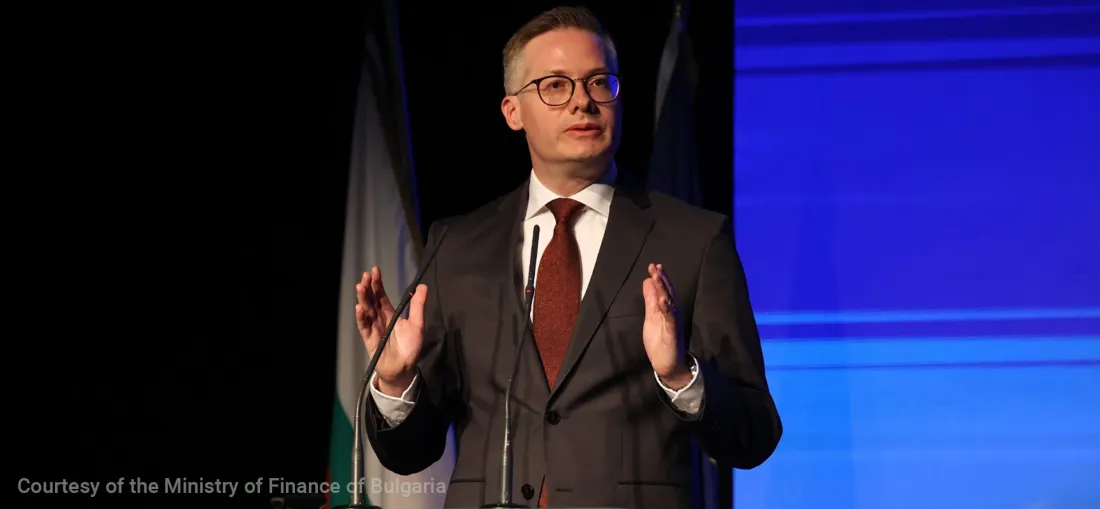Speech by Matjaž Sušec at “Bulgaria towards the euro” conference

Matjaž Sušec
ESM Head of Strategy and Institutional Relations
Panel session “Eurozone membership – opportunities and challenges”
“Bulgaria towards the euro” conference
Sofia, 24 February 2023
(Please check against delivery)
Excellencies,
Distinguished guests,
It’s an honour and pleasure for me to be part of this important event today in Sofia. Unfortunately, Mr Gramegna could not attend this high-level conference due to previous engagements. He asked me to convey his apologies and best regards.
Adopting the euro is the deepest form of integration within the EU. The benefits accruing to citizens, businesses, and countries are manifold. Converging with other euro area members contributes to a country’s wealth and protects it from external shocks. Joining the euro allows to reap the benefits of the EU internal market.
Sharing a same currency makes comparing prices within the euro area easier. It fosters competition, which, all other things being equal, helps to drive down consumer prices. Exchange rate fluctuations within the monetary union do not exist. For Bulgaria, this is already virtually true due to its currency board arrangement.
Within a monetary union, transparency increases. Costs, uncertainty, and risks are reduced. This is favourable to expanding trade and investment. If we look at Eurostat data, almost half of Bulgaria’s exports of goods are destined to the euro area, and more than 40% of its imports originate from the euro area. The advantage is considerable. Moreover, Bulgaria would become more attractive for foreign direct investment and the country would likely attract more tourists from euro area Member States. Already today, 25% of all tourists in Bulgaria are from the euro area. Being part of a global reserve currency is also a key factor in attracting trade and investment from all over the world.
From a market perspective, something we look at closely at the European Stability Mechanism (ESM), is a country's access to euro capital markets. The experience with previous countries that joined the euro and the ESM shows that this improves with euro accession due to – among other things – expected higher credit ratings. Some rating agencies have already upgraded Bulgaria’s rating before the euro area adoption. By joining the euro, Bulgaria would have access to a well-established and efficiently functioning euro pool for funding.
The country would therefore enhance its investor base, market access, and enjoy potentially lower funding costs. It would also help weather possible economic downturns. This is because Bulgaria would benefit from the euro area crisis management framework. This means the country could rely on the euro area safety nets in the event of future crises.
For example, after adopting the euro, Bulgaria would join the ESM, which would shield the country from market turbulences. Being part of the ESM’s safety net would reassure global investors that Bulgaria is under a protective umbrella.
The euro area started without an ESM. There was a gap in the euro area institutional framework. During the sovereign debt crisis, we all recognised that euro members need protection in case they are not able to refinance their debt at affordable rates.
We celebrated the ESM’s 10th anniversary last year. The ESM and its predecessor, the EFSF, provided close to €300 billion in loans to five countries. This stability support played a major role in safeguarding the integrity of the euro area.
The beneficiary countries strengthened their public finances and implemented key structural reforms. They have had on average, better performance than the euro area in the last years and the reforms carried out during the euro crisis placed them in a stronger position to withstand first the pandemic and now the energy crisis.
But the ESM is not only useful when there is a crisis. Its mere existence increases the stability of a member country. It ensures that you have better access to capital markets.
The ESM is expected to play an even larger role and contribute to the resilience of the euro area in the future.
It has a current lending capacity of around €417 billion thanks to a paid-in capital of more than €80 billion. It is the international financial institution with the highest paid-in capital in the world. When becoming part of the euro area, a member country also joins the ESM. It is represented in the ESM Board of Governors, the highest decision-making body of the institution, which decides, among others, on financial assistance.
Becoming a member of the euro area can be an arduous journey.
It involves thorough economic and financial assessments by the European Central Bank (ECB) and the European Commission (EC), and compliance with formal accession criteria by candidate countries.
Only after a country meets the convergence criteria is it set for euro adoption.
And the prospect of joining the euro creates strong incentives for a country to carry out far-reaching structural reforms, while achieving prudent fiscal policies and keeping domestic inflation under control.
This has also been the case for Bulgaria.
The country needs to continue this path to fulfil its membership and reap the benefits of the single currency and its underlying safety net.
It must continue its efforts to comply with the requirements, strive to keep a strong fiscal and economic position, and complete the reform agenda.
The euro area has nearly doubled since its launch in 1999, when it started with 11 countries. Today we are 20. New members make the currency union stronger in international financial markets and strengthen the international role of the euro. So, the benefits go both ways.
Thank you for your attention.
Author

Contacts


